Related Research Articles
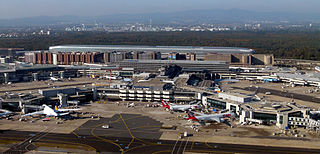
As a densely populated country in a central location in Europe and with a developed economy, Germany has a dense transport infrastructure.

North Rhine-Westphalia, commonly shortened to NRW, is a state (Land) in Western Germany. With more than 18 million inhabitants, it is the most populous state of Germany. Apart from the city-states, it is also the most densely populated state in Germany. Covering an area of 34,084 square kilometres (13,160 sq mi), it is the fourth-largest German state by size.

The Deutsche Bahn AG is the national railway company of Germany. Headquartered in the Bahntower in Berlin, it is a joint-stock company (AG). The Federal Republic of Germany is its single shareholder.
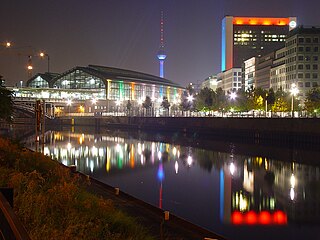
The Berlin S-Bahn is a rapid transit railway system in and around Berlin, the capital city of Germany. It has been in operation under this name since December 1930, having been previously called the special tariff area Berliner Stadt-, Ring- und Vorortbahnen. It complements the Berlin U-Bahn and is the link to many outer-Berlin areas, such as Berlin Brandenburg Airport. As such, the Berlin S-Bahn blends elements of a commuter rail service and a rapid transit system.

DB Regio AG is a subsidiary of Deutsche Bahn which operates regional and commuter train services in Germany. DB Regio AG, headquartered in Frankfurt am Main. It is a 100% subsidiary of the Deutsche Bahn Group and there part of the DB Regio business segment, which also includes DB Regionnetz Verkehrs GmbH and other independent subsidiaries.

Köln Hauptbahnhof or Cologne Central Station is a railway station in Cologne, Germany. The station is an important local, national and international transport hub, with many ICE, Thalys and Intercity trains calling there, as well as regional Regional-Express, RegionalBahn and local S-Bahn trains. EuroNight and Nightjet night services also call at the station. It has frequent connections to Frankfurt by way of the Cologne–Frankfurt high-speed rail line, which starts in southern Cologne. On an average day, about 280,000 travellers frequent the station, making it the fifth busiest station in Germany.

Dortmund Hauptbahnhof is the main railway station in Dortmund, North Rhine-Westphalia, Germany. The station's origins lie in a joint station of the Köln-Mindener Eisenbahn and Bergisch-Märkische Eisenbahn which was built north of the city centre in 1847. That station was replaced by a new station, erected in 1910 at the current site. It featured raised embankments to allow a better flow of traffic. At the time of its opening, it was one of the largest stations in Germany. It was, however, destroyed in an Allied air raid on 6 October 1944.
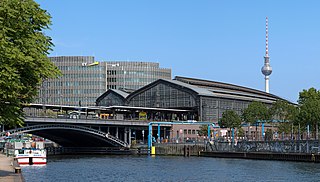
Berlin Friedrichstraße is a railway station in the German capital Berlin. It is located on the Friedrichstraße, a major north-south street in the Mitte district of Berlin, adjacent to the point where the street crosses the river Spree. Underneath the station is the U-Bahn station Friedrichstraße.

Cologne/Bonn Airport is a station at Cologne Bonn Airport in the German state of North Rhine-Westphalia. It was built as part of the Cologne–Frankfurt high-speed rail line and opened in June 2004 on an approximately 15 kilometre-long airport loop. It is served by Intercity-Express (ICE), Rhine-Ruhr S-Bahn and regional services.

Neuss Central Station is the railway station for the city of Neuss in the German state of North Rhine-Westphalia. The main station building is built on a platform between the tracks and it is located at the junction of the Lower Left Rhine Railway and the Mönchengladbach–Düsseldorf railway. These lines also connect with the Düren–Neuss railway and the Neuss–Viersen railway; the latter has ended since 1984 at Kaarster See station and is operated by the private Regiobahn company.
The Altenbeken–Kreiensen railway is part of a former long-distance route in Germany from the Ruhr area via Altenbeken, Höxter-Ottbergen, Holzminden, Kreiensen and Seesen towards Berlin. The once continuous double track main line railway is now operated as a single track east of Ottbergen. It runs through the Egge ridge and along the northern edge of the Solling hills.

The Oberhausen-Osterfeld Süd–Hamm railway, also called the Hamm-Osterfeld line, is a 76-kilometre long double-track electrified main line railway at the northern edge of the Ruhr in the German state of North Rhine-Westphalia.
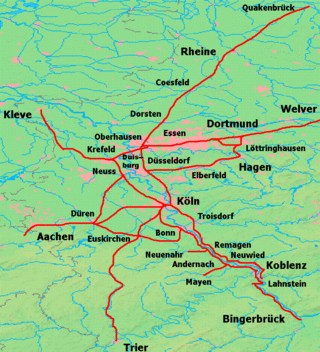
The Osterath–Dortmund-Süd railway is a historically significant line in the German state of North Rhine-Westphalia. Parts of it are closed, much of it is now used for freight only, but several sections are still used for Regional-Express, Regionalbahn or Rhine-Ruhr S-Bahn services.
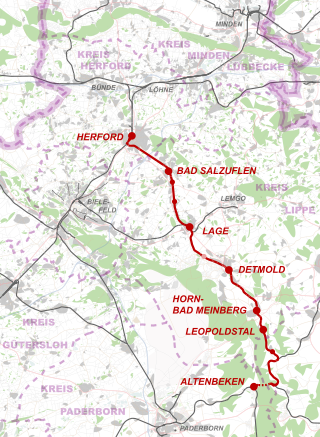
The Herford–Himmighausen railway is a 48 km-long line from Herford via Detmold to Himmighausen and is a single-track and electrified main line. It is located in Ostwestfalen-Lippe in the German state of North Rhine-Westphalia and is part of Deutsche Bahn’s Münster-Ostwestfalen regional network (MOW), which has its headquarters in Münster. In Herford this route is known as the Lippische Bahn. The line from Herford to Detmold was built by the Cologne-Minden Railway Company.

The Warendorf Railway is a single-track branch line from Münster via Warendorf to Rheda-Wiedenbrück in the German state of North Rhine-Westphalia. It is now served by a train that continues from Rheda-Wiedenbrück to Bielefeld. The line is a section of the former Münster–Rheda–Lippstadt railway and is now operated as part of Deutsche Bahn’s Münster-Ostwestfalen regional network, based in Münster. According to Deutsche Bahn it is the accident-prone railway line in Germany.
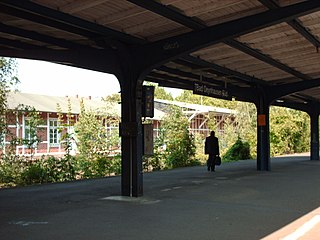
Bad Oeynhausen Süd (south) station is located in the Westphalian spa town of Bad Oeynhausen in Minden-Lübbecke in the German state of North Rhine-Westphalia. It is on the Elze–Löhne railway and is classified by Deutsche Bahn as a category 6 station.

S21 is a planned second north-south route for the Berlin S-Bahn, which will connect Berlin Hauptbahnhof to the Berlin Ringbahn to both north and south. The first section is under construction and is expected to go into operation in December 2022.
Bernd Reuther is a German politician of the Free Democratic Party (FDP) who has been serving as a member of the Bundestag from the state of North Rhine-Westphalia since 2017.

The 2022 Nord Stream pipeline sabotage were a series of clandestine bombings and subsequent underwater gas leaks that occurred on the Nord Stream 1 and Nord Stream 2 natural gas pipelines on 26 September 2022. The sabotage happened as the Baltic Pipe was being opened for natural gas to come in from the North Sea through Denmark to Poland; however, the perpetrators' identities and the motives behind the sabotage remain debated. Both pipeline pairs were built to transport natural gas from Russia to Germany through the Baltic Sea, and are majority owned by the Russian majority state-owned gas company, Gazprom.
References
- ↑ German police open probe into sabotage of rail system, Financial Times, Guy Chazan, October 2022.
- 1 2 Rail traffic in northern Germany disrupted by 'sabotage' , France 24, 8 October 2022.
- 1 2 No sign that foreign state was behind German rail sabotage, police say, Reuters, 9 October 2022.
- ↑ Federal prosecutors take over German rail sabotage probe, Washington Post, 13 October 2022.
- 1 2 Attack on German Rail Network ‘Targeted, Professional,’ Police Say, Josefine Fokuhl, Bloomberg, 9 October 2022.